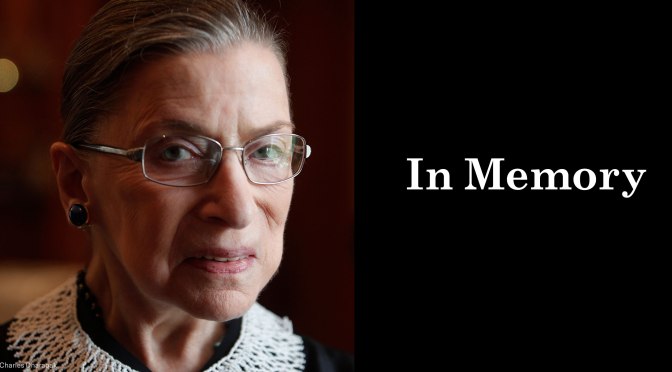Last Friday, we lost Supreme Court Justice Ruth Bader Ginsburg (“RBG”) to cancer. She was a trailblazer and influential jurist, serving on the Supreme Court (“SCOTUS”) from 1993-2020. Her work as an advocate and litigator in the 1970s changed our world even before she ascended to the highest court in the US.
RBG’s introduction to the law
- RBG was inspired to become a lawyer during the Red Scare to defend people’s rights and freedoms from HUAC and McCarthyism
- She was 1 of only 9 women in a class of over 500 at Harvard Law School in 1956. The Dean, a proponent of admitting women, invited all 9 to his residence and asked them why they were taking a seat that could be occupied by a man, as a way to convince male faculty members.
- Her granddaughter’s class of 2017 was the first Harvard Law School class that was 50/50
- RBG started Harvard Law School when she had a 14-month-old daughter and was the only woman in her class who was also a mother
- In her 2nd year and her husband’s 3rd year of law school, he was diagnosed with testicular cancer, leaving her to raise their toddler, help him study and recuperate as well as study herself
- She made the Harvard Law Review in her 2nd year
- She transferred to Columbia Law School in her final year when her husband took a job in New York, made the Columbia Law Review and graduated first in her class
Pre-SCOTUS legal career
- Despite her impressive performance at both Harvard and Columbia Law Schools, RBG struggled to find employment at New York law firms where her male classmates and husband worked
- In 1963 she began teaching at Rutgers Law School a course in the new subject of gender and the law, setting up her future as a litigator and advocate
ACLU Women’s Rights Project
- RBG (Professor Ginsburg at this time) co-directed the ACLU Women’s Rights Project with Brenda Feigen from its founding in 1972 until her appointment to the federal bench in 1980
- They developed a philosophy to take cases that would make “good law”
- RBG followed the model of Thurgood Marshall whose racial equality cases were based on the Equal Protection Clause
- She took an incrementalist and strategic approach to social change
- Brenda Feigen: “She captured for the male members of the court what it was like to be a second class citizen.”
- The first case RBG argued, and won, before SCOTUS was Frontiero v Richardson (1973) in which the plaintiff was a second lieutenant in the Air Force who was denied the same housing allowances for herself and her spouse that were given to male married service members
- In Weinberger v. Wiesenfeld (1975), she took the case of a widower denied benefits to demonstrate how gender-based discrimination harms all people (in this case, a father and son)
- RBG won five out of the six cases she argued before SCOTUS
- President Carter appointed her to the US Court of Appeals for the DC Circuit in 1980; she served until her confirmation (96-3) to SCOTUS in 1993, becoming the 2nd female and 1st Jewish justice
Notable SCOTUS majority cases
- United States v. Virginia (1996) — RBG wrote the majority opinion finding a military’s school’s all-male admissions policy and state’s proposal of a parallel program for women violated the Equal Protection Clause of the Fourteenth Amendment
- Olmstead v. L.C. (1999) — a win for the right of people with disabilities under Title II of the ADA
- Kelo v. City of New London (2005) — eminent domain case found in favor of New London
- Obergefell v. Hodges (2015) — landmark decision overturning marriage bans and legalizing same-sex marriage in every state
- Whole Woman’s Health v. Hellerstedt (2016) — the H.B.2 law in Texas presented an undue burden to women seeking abortions. Justice Ginsburg wrote in her concurrence that any law that made accessing abortions more difficult in the name of safety could not pass judicial review: “When a state severely limits access to safe and legal procedures, women in desperate circumstances may resort to unlicensed rogue practitioners, faute de mieux, at great risk to their health and safety.”
Notable SCOTUS dissents
- Ledbetter v. Goodyear Tire and Rubber Co. (2007) – “the Court does not comprehend, or is indifferent to, the insidious way in which women can be victims of pay discrimination… Initially, you may not know that men are receiving more for substantially similar work…only over time is there strong cause to suspect that discrimination is at work…Today, the ball again lies in Congress’s court to correct the error into which the Court has fallen.”
- Shelby County v. Holder (2013) – “This Court’s decision is like throwing away your umbrella in a rainstorm because you are not getting wet.”
- Burwell v. Hobby Lobby (2014) – “In the Court’s view, RFRA demands accommodation of a for-profit corporation’s religious beliefs no matter the impact that accommodation may have on third parties who do not share the corporation owners’ religious faith—in these cases, thousands of women employed by Hobby Lobby and Conestoga or dependents of persons those corporations employ.”
Legacy
- Her work as an advocate and litigator set the stage decades later for cases like United States v. Virginia and Obergefell v. Hodges
- Even her losses inspired change, through legislation:
- In response to her argument in Struck v. Secretary of Defense (1972) where Ginsburg challenged pregnancy discrimination as sex discrimination, Congress enacted the Pregnancy Discrimination Amendment to Title VII (PDA) in 1978
- In response to her dissent, the Lilly Ledbetter Fair Pay Act was signed by President Obama in 2009, a copy of which hung in Justice Ginsburg’s office
Nothing to do with the law
- By her husband’s and children’s accounts, she was a terrible cook — her husband, Marty, cooked and their friends created a cookbook of his recipes after he died
- The RBG Workout – Stephen Colbert works out with Ruth Bader Ginsburg
- She had a great friendship with the late Justice Antonin Scalia, a conservative justice, about which a play was written: Scalia/Ginsburg, a comic opera.
- Scalia described her as “a tigress on civil procedure”, that “she has done more to shape the law in this field than any other justice on this court” and that “she will take a lawyer who is making a ridiculous argument and just shake him like a dog with a bone.”

- She loved the opera and had a brief speaking role as the Duchess of Krakenthorp in Gaetano Donizetti’s The Daughter of the Regiment for which she wrote her own lines
- She was the first woman and first Jewish person to lie in state in the US Capitol
More information
- Remembering the Notorious RBG – a roundup of remembrances and tributes
- 20 Years of Closed Door Conversations with Ruth Bader Ginsburg
- Notorious RBG (Tumblr)
- How Ruth Bader Ginsburg became the ‘Notorious RBG’
- RBG, R.I.P. – a few personal reminiscences by a former law clerk
- Law360 Pro Say podcast: The Life And Legacy Of Ruth Bader Ginsburg
- The Cato Institute Podcast: Remembering Justice Ruth Bader Ginsburg
- Stay Tuned with Preet: RBG & The Mountains She Moved (with Melissa Murray)
- RBG (2018 documentary)
- ‘Struck’ by Stereotype: Ruth Bader Ginsburg on Pregnancy Discrimination as Sex Discrimination (PDF)














